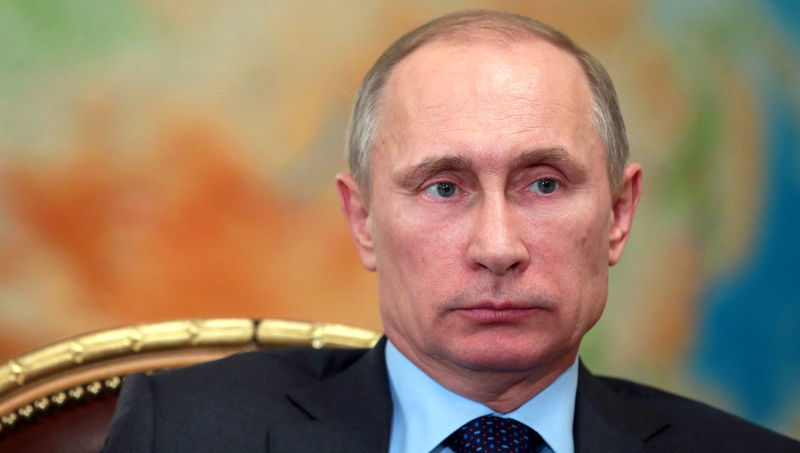Russia’s nuclear weapons
March 2, 2018 | Expert Insights

Russian President Vladimir Putin has claimed that the nation has developed an arsenal of nuclear weapons that are invincible and can pierce through US defences. Meanwhile, the US has accused Russia of breaching Cold War-era treaties.
Background
The Russian Federation is the successor state to the Soviet Union. Before its dissolution, the Soviet Union and the US were the key factions in world politics. They were briefly allies during World War II but by the end of the war, they had become hostile. Brewing mistrust was one of the main reasons for the Cold War.
The end of the Cold War and the dissolution of the Soviet Union (as well as the creation of Russia) seemingly brought an end to a period of uncertainty and turmoil. Relations even improved between the two nations during the tenure of Russia's President Boris Yeltsin but it took a significant step back under Putin.
Relations between Russia and the US deteriorated in 2014 when Russia annexed Crimea. It cited a controversial referendum for doing so. As a result, Barack Obama and his EU allies unveiled a coordinated set of sanctions against Russia and ordered it to leave Crimea. Russia responded with counter-sanctions.
Russia’s alleged interference in the US Presidential elections has further caused tensions in the ties. Despite Russia’s repeated denials, the US imposed harsh sanctions on Russia. In retaliation, Russia announced that 755 US diplomats would have to leave Russia by September 1, 2017.
The Intermediate-Range Nuclear Forces Treaty (INF Treaty) is the abbreviated name of the Treaty between the United States of America and the Union of Soviet Socialist Republics signed in Washington, D.C. by President Ronald Reagan and Soviet leader Mikhail Gorbachev on 8 December 1987. The treaty eliminated all nuclear and conventional missiles, as well as their launchers, with ranges of 500–1,000 kilometers (310–620 mi) (short-range) and 1,000–5,500 km (620–3,420 mi) (intermediate-range).
Analysis
According to Putin, the weapons developed by Russia will easily render NATO defenses "completely useless.” The nation has reportedly developed a highly advanced arsenal of nuclear weapons.
Putin was speaking less than a month before the Russian elections are slated to be held. He is expected to win a fourth term as president of the nation. He spoke about the various weapons that have been developed in the country and stated, “Russia still has the greatest nuclear potential in the world, but nobody listened to us. Listen now."
He highlighted the prowess of specific weapons including low-flying cruise missile capable of stealthy operation. "Since the range is unlimited, it can manoeuvre as much as necessary," Putin said. He also added about the West, “They need to take account of a new reality and understand ... [this]... is not a bluff."
He spoke about a "low-flying, difficult-to-spot cruise missile... with a practically unlimited range and an unpredictable flight path, which can bypass lines of interception and is invincible in the face of all existing and future systems of both missile defence and air defence".
Russia Strategic Missile Force Commander Sergei Karakayev told the state news agency Tass -"Creating the strategic missile system Avangard, equipped with a glide vehicle, has become a no less efficient response to the deployment of the American anti-missile defences…Its testing has been successfully completed."
The US has responded by noting that Russia has breached Cold War-era treaties. White House press secretary Sarah Sanders told reporters, “Russia has been developing destabilizing weapons systems for over a decade, in direct violation of its treaty obligations. President Trump understands the threats facing America and our allies in this century and is determined to protect our homeland and preserve peace through strength," she added. "US defence capabilities are and will remain second to none."
In January 2018, former Soviet President Mikhail Gorbachev urged both US and Russia resolve a dispute over a nuclear arms control treaty. The treaty was signed 30 years ago. The current White House announced in March 2017 that Russia was in violation of the treaty and that terms would have to be reviewed once again.
Assessment
Our assessment is that ties between US and Russia are currently at a historic low. The Russian President has compared the tense relations to the deteriorated ties the two countries shared during the Cold War. If the nuclear arms control treaty is revoked, then it is likely that ties would be further hit. In addition, there could be fears of yet another arms race, similar to what took place during the Cold War.








Comments